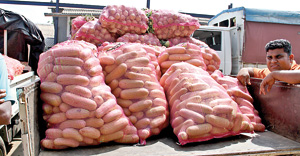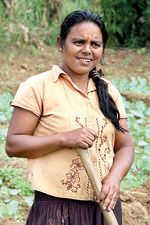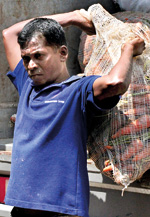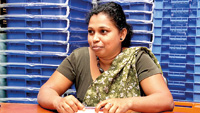Fruits and vegetables continue to come in the traditional gunny bags and string sacks, long after the January 15 deadline that outlawed this form of transport, with the introduction of the plastic crate rule.
From the farmer to the trader, distributor and transporter, the law is being flouted in the open, and the majority of those involved in this sector have their own reasons for doing so.
 |
| Defying the ban, vegetables in sacks are loaded onto a lorry at the Dambulla Economic Centre. Pix by Indika Handuwala |
This new regulation, however, is also being cheered on by a few but, at the end of the day, it is the farmer who will have to bear the brunt of it all, such as a drop in profits, etc.
Dambulla, in the north-central province, is known as the country’s basin for traditional crops, but now, farmers are weary of tilling the ground for fear of incurring losses, if they are compelled to use plastic containers to pack their yields, before its transport from the field to the economic centre situated many kilometers away in the main town.
Following the initial protests against this regulation, the relevant authorities relaxed certain clauses in the regulation, and assured that the growers will be exempted from this new rule, but the farmers are not listening, the Sunday Times learns.
Trade Secretary Sunil S. Sirisena told the Sunday Times that the regulation does not cover the grower, but only the transporter, distributor and the trader, and that the farmers have nothing to worry about.
However, farmers are baffled about such statements, simply because, if, on one hand, they do not use the plastic crate, the transporter, on the other hand, will simply refuse to load the goods onto their vehicles, leaving their produce to rot.
 |
| Farmer D.M. Nandani Menike |
“Such statements have been made by certain authorities from time to time, but no one has officially informed us,” said a local cabbage grower, K.G. Swaranalatha.
She added that, the farmers transport the vegetables in public buses, but this would not be the case with the plastic crates, which will have to be transported by some sort of vehicle, such as a tractor, van or lorry.
“At this point, the transporter will insist that the produce, be it vegetables or fruits, are packed in plastic crates, or else, they would not load the goods into their vehicle, as they risk being fined while on the road to the delivery point. So that means, we will be forced to incur additional costs for transport and the plastic crates,” she added.
“We have no annual, casual, or sick leave, rain or sunshine, the farmer has to plough the field or go hungry, and now, they have brought this silly plastic container law to make matters more damnable,” another female grower, D.M. Nandani Menike of Unuapunduruhewa village said.
With the farmers having said that, the next to frown on the container issue is wholesale trader U.N. Stanley Perera operating from within the Dambulla Economic Centre (DEC).
His problem is that, these days, there are fewer wholesale buyers from Colombo and other major towns in the country, because they don’t want to invest in plastic crates that range from Rs 1,500 to Rs 2,000.
 |
| More sacks: Scene at the Pettah market on Friday. Pic by Mangala Weerasekera |
He said, since January 15 this year, the date the compulsory use of plastic containers came into force, there has been a near 40% drop in wholesale buyers trading inside the DEC.
He added that the farmers continue to bring in their usual stocks, but there are no buyers, even at rock-bottom prices. “As a result, tons of vegetables have to be discarded and, at the end of the day, there will be a scarcity of vegetables in the retail market, with prices of every variety set to rise throughout the country,” he warned.
From the farmer and the trader, the next person to be affected is the wholesale buyer who supplies the retail market.
One such person is K.H.N. Dusantha who operates two lorries on a daily basis from Dambulla to Colombo and suburbs.
He said that such a practice should be confined to the more affluent and developed countries, and it should not be allowed to happen here for more than one reason. “Earlier, I used a single labourer to load and unload, but now, with the boxes, three are needed. Not only that, this also means more wages and less space inside the vehicle and, as a result, the quantity transported gets drastically cut.
“Earlier, the lorries on the return trip from Colombo, were loaded with various merchandise, and sold to the village markets and shops, and thereby, we were able to balance the profit. Now, what will happen is that, the lorries will have to transport the empty crates on the return trip, badly damaging business,” Mr. Dushantha said.
Secretary- Traders Association, Dambulla, U.R. D.A. Nandasiri said that, if the farmers are forced to adhere to the plastic crate rule, then they are better off selling kassippu, because there will be no profits for them.
He added that, the plastic crates are purchased from three private manufacturers and sold through ‘Sathosa’, also known as the Co-operative Wholesale Establishment (CWE), which is a State enterprise.
 |
| The country must move forward: A.N. Dissanayake at the plastic
crate sale centre at the Dambulla Economic Centre |
“So, no one really knows who is making money out of this regulation,” he added.
However, there are others who feel that the new regulation is good for business, and fair by the consumer.
Vegetable exporter P.T. Amarajeewa is all for the plastic crate, saying that, apart from other issues, it will cut down on waste, corruption and also be more hygienic.
According to Mr. Amarajeewa, many farmers are known to stuff the gunny bags with at least 10 to 15 kg of damaged and rotten vegetables and fruits, and at the end, the buyers are taken to the cleaners.
“The gunny bags are not emptied of their contents on reaching the wholesale market. Each bag is weighed as it is, loaded on to the trucks and later transported out. With the plastic crate, this will not be possible, as the contents can be clearly seen from the outside. There will be little or no damage to the produce, and at the end of it all, it will be more hygienic,” he added.
He suggested that, if the plastic container is an issue, disposable cardboard boxes could be used. “For example, if fruits such as apples and grapes imported from various parts of the world, are packed in such cardboard boxes, the same thing could be done over here, and the matter will be settled.
His views were endorsed by the sales official at the DEC, Ms. A.N. Dissanayake who thinks that the country must move on with the rest of the world, instead of sticking to age-old traditions.
She added that, since July last year to date, a total of 5,098 boxes had been sold to traders and others, and this indicates there are many favourable to the idea.
She also endorsed the view that many farmers were not honest, and were sending rotten produce hidden inside the gunny bags.
Only the other day, a trader complained that the wooden boxes stuffed with tomatoes had been soaked in water to increase their weight. “This is just one among many other malpractices the farmers are involved in,” Ms. Dissanayake added.
The authorities for their part were forced to come down from their earlier hard line position regarding the plastic crates, following a howl of protest and adverse media exposure, and removed some 12 items from the list of 25 that were ordered to be transported in plastic crates.
Additional reporting by Kanchana Kumara Ariyadasa
(Click here to watch the video) |





